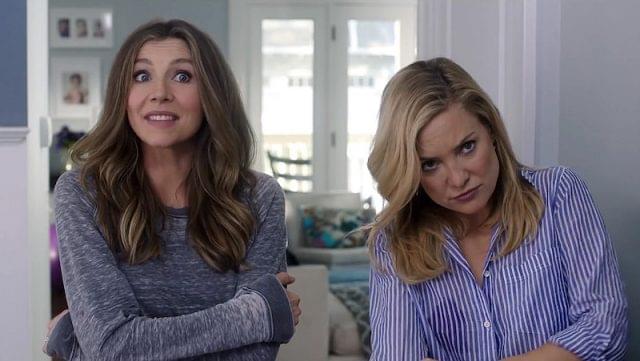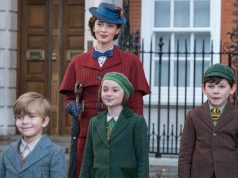
The Internet doesn’t have enough space for me to describe all the ways that “Mother’s Day” is bad, so I will have to be selective about what I include. Note that this already makes me better than the movie, which included everything.
It’s directed (to use the term loosely) by Garry Marshall, who died 15 years ago but whose body has continued to make movies as an autonomic response, like how a chicken will keep crapping after you cut its head off. You may recall his previous holiday-themed large-ensemble romantic comedies, “Valentine’s Day” and “New Year’s Eve.” “Mother’s Day” is a sort of spiritual sequel to those, in that it is also a cheap, lazy, derivative, bloated monstrosity that feels like it’s four hours long yet somehow also feels like it was shot in one weekend at Garry Marshall’s house.
As always, there are a thousand characters, five hundred plots borrowed from two hundred sitcoms, and not enough time (even in a four-hour movie) to develop any of them. To wit:
– Sandy (Jennifer Aniston) is a mother of two boys whose ex-husband, Henry (Timothy Olyphant), has unexpectedly married a young tart named Tina (Shay Mitchell), knocking poor Sandy for a loop. In the first scene, Sandy has just gotten out of the shower and is wearing only a towel as she interacts in her kitchen with Henry, their sons, and their sons’ school friends. (Never mind how improbable it is that this character would be comfortable with that.) Later, Sandy stops by Henry’s house and sees Tina dressed in something revealing and bosomy. She mentions it to Henry — along the lines of, “Hey, tell your wife to put on some clothes around the boys and their friends!” — and you see where this is going. BUT HENRY DOESN’T CALL HER OUT. He doesn’t say, “What about the other morning, when you were parading around in a towel in front of these same boys and their same friends?” The movie clearly, deliberately sets up a parallel situation, then doesn’t pay it off.
– Jesse (Kate Hudson) lives next door to her sister Gabi (Sarah Chalke). (A sample line of dialogue that I am not making up: “I’m your sister, and I live next door!”) They are both keeping secrets from their racist, homophobic parents: Jesse has an Indian-American husband, Russell (Aasif Mandvi), and Gabi has a wife, Max (Cameron Esposito). The parents are outrageous rednecks from a cartoon who are played by Margo Martindale and Robert Pine. When they show up for a surprise visit and Gabi makes the inevitable “This is my wife” revelation, Mom’s actual response is a big, exaggerated, “HUUNH??” Like she’s never even HEARD of the idea of lesbians before. I don’t remember how Mom gets over the homophobia, but she gets over the racism by Skyping with Russell’s mother. (Dad gets over it because Mom does, I guess.)
– Bradley (Jason Sudeikis) is a widower with two daughters. His wife (Jennifer Garner) was a Marine — if the movie can’t drag a sentimental tear out of you with the mom stuff, it’ll get you with the patriotism. One of the daughters has just started getting her period, so Bradley has to buy tampons at the grocery store. (Is there an “I NEED A PRICE CHECK ON THESE EMBARRASSING TAMPONS” gag? Of course there is.) Later, Bradley is at a backyard birthday party, and he karaokes “The Humpty Dance” in front of the assembled parents and children before falling backwards over the patio railing and breaking his ankle.
– Miranda (Julia Roberts) is a very famous jewelry designer on the Home Shopping Network. She has never had time for a family (or, evidently, to select a flattering hairstyle). She has nothing to do with anything else in the movie. OR DOES SHE?
– Zack (Jack Whitehall) and Kristen (Britt Robertson) are a cute young couple with a cute baby. Both partners work at a tavern, and Zack is an up-and-coming stand-up comedian who eventually achieves success by taking the baby onstage with him and winning the crowd over with some half-hearted, semi-improvised baby-related jokes. Meanwhile, Kristen is reluctant to get married because she has abandonment issues. We know this because she says, in a line of dialogue that I am not making up, “I have abandonment issues!” And THAT’S because she was put up for adoption as a baby and has never met her real mother. Who could it be?? It is a mystery.
Composed primarily of declarative sentences and plot exposition, the screenplay is credited to Anya Kochoff Romano (“Monster-in-Law”), Matt Walker (nothing), and Tom Hines (also nothing), but Lily Hollander (still nothing) and Marshall himself also get “story by” credit. That’s a total of five writers claiming responsibility — and yet there are lesser crimes, like the murder of Jimmy Hoffa, that remain unsolved. The universe is unjust, is my point.
One thing I didn’t mention because it doesn’t actually affect the story is that all of this is taking place on Mother’s Day weekend. To justify the film’s existence, the people in the movie talk about Mother’s Day like it’s Christmas, using phrases like “this time of year” (you know — Mother’s Day season) and giving elaborate thought to their plans for the day. There’s even a Mother’s Day parade; the lesbians are making a float for it. Is there really a Mother’s Day parade in Atlanta, where the film is set? I don’t know. Is Atlanta really 99.9% white, like it is in the movie? I don’t know, but I don’t think so.
Also included are Garry Marshall’s trademark random edits, confusing insert shots, and weird moments where the camera lingers too long on a scene because Marshall wants to give screen time to his friends. There’s a ridiculous amount of ADR (where dialogue is re-recorded in post-production because the on-set recording wasn’t good enough or the line was rewritten); that and the numerous setups without payoffs suggest there was a lot of tinkering in the editing room. Which is baffling, because it also feels like Marshall used the first take on everything, keeping fumbled line readings and other sloppy imperfections. In fact, I suspect the only reason he included outtakes over the closing credits was to prove that there were some.
To summarize, my mom is great and I love her. Her birthday is actually on Valentine’s Day, which means Garry Marshall has now tried twice to make me hate her. And it hasn’t worked! Even the worst filmmaking cannot break the bond between mother and child. Unless she makes me take her to one of these movies sometime, in which case all bets are off.
F (1 hr., 58 min.; )





